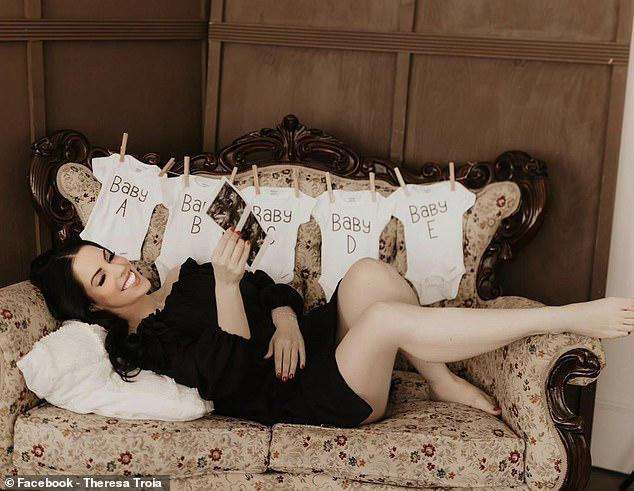In a story that reads like a modern-day miracle, Theresa Troia, 36, has made headlines across the nation after giving birth to a set of naturally conceived quintuplets. The astounding event is not only a one-in-60-million occurrence but also a remarkable twist of fate, as Troia herself was born a quadruplet—a one-in-a-million baby.
The El Paso-based nurse consultant delivered her five babies—Kyla Rose, Joseph Anthony, Jaxon Thomas, Viviana Lily, and Isabella Gianna—via C-section on June 3 at just 28 weeks gestation. This was the first time in the history of Las Palmas Medical Center that a set of quintuplets was born there, and only the second set to be born in El Paso. The birth was a culmination of a pregnancy that defied the odds at every turn.
A Pregnancy of Miracles
Troia, who conceived naturally with her former partner and did not undergo any fertility treatments, was shocked to learn she was carrying five babies. In the U.S., fewer than 10 sets of quintuplets are born each year, making her pregnancy a truly exceptional event. She told the media that her pregnancy felt surprisingly normal. "It was odd. I didn't experience any cravings and there was no swelling or sickness," Troia revealed. "If I hadn't known I was pregnant, I would have never suspected it. My belly didn't even grow huge. I looked more like I was carrying one baby than five."
The journey, however, was not without its challenges. According to reports, some medical professionals were skeptical of her ability to carry all five babies, with one provider even "dropping" her case. However, with the support of a dedicated team, including Dr. Aaron Poole, an OB-GYN and maternal-fetal medicine specialist at Las Palmas, Troia was able to push forward. "He was the person who gave her hope when it felt like she had none," her family shared.
The Post-Birth Journey and Ongoing Updates
Following their premature delivery, all five babies were immediately taken to the Neonatal Intensive Care Unit (NICU). While two of the quintuplets, Isabella and Viviana, are identical twins who shared a placenta, they were all born in good health for their gestation.
As of early August, two months after their birth, the "little fighters" are making remarkable progress. While three of the babies were given the all-clear to go home around nine weeks old, the remaining two—Joseph and Viviana—are still in the NICU, but are expected to be discharged soon as they continue to gain strength. Troia shared with PEOPLE Magazine that while there have been "scary moments along the way," watching them grow stronger has been the "most emotional, beautiful experience" of her life.
The new mother has also shared her daily struggles and triumphs as a single mom to five newborns. She estimates going through about 35 diapers a day, with that number expected to climb to over 50 once all the babies are home. Baby formula, which typically lasts a week for a single baby, is being consumed in one day. Despite the financial and emotional demands, Troia says she finds the experience deeply rewarding.
In a proactive move to prevent future pregnancies and reduce the risk of ovarian cancer, Troia underwent a salpingectomy—the removal of her fallopian tubes—during her C-section. She reports a smooth recovery, a testament to her body's incredible resilience.
The Rarity of High-Order Multiple Births
The rarity of Troia's birth story is twofold. First, the birth of quadruplets in the UK is extremely rare. According to the Twins Trust, only 0.03% of all births in the UK are triplets, and quadruplets are even rarer. For example, in 2016, there were only five sets of quadruplets or higher-order births in England and Wales. This makes Troia's own birth an extraordinary event.
When it comes to Muslim countries, there is no specific religious or cultural factor that would make quadruplet births more or less rare. The frequency of multiple births, including quadruplets, is primarily determined by biological and medical factors. While some Muslim-majority countries have historically had higher total fertility rates, these rates are in a global decline. The prevalence of multiple births is often linked to factors like genetic predisposition (as seen in Troia's case), maternal age, and, most significantly, the increasing use of assisted reproductive technologies like IVF.
In a few notable instances, multiple births in Muslim countries have gained attention, such as the Al-Ghamdi quintuplets born in Saudi Arabia in 1988 or quadruplets born to a displaced Palestinian mother in Gaza in 2023. These births, while often widely celebrated as blessings, are nonetheless rare events, just as they are in the UK, the U.S., and other parts of the world.
Theresa Troia's story is a powerful reminder of the deep and often mysterious connection of family. She believes her quintuplets are a sign from her mother, who passed away a decade ago. "It feels like my mom—my first love, who I lost far too soon—gave them to me," she said. "Her legacy is alive in them. My quintuplets are my miracle, my history, and my heart."



_2.jpg)
_3.jpg)



.svg)

